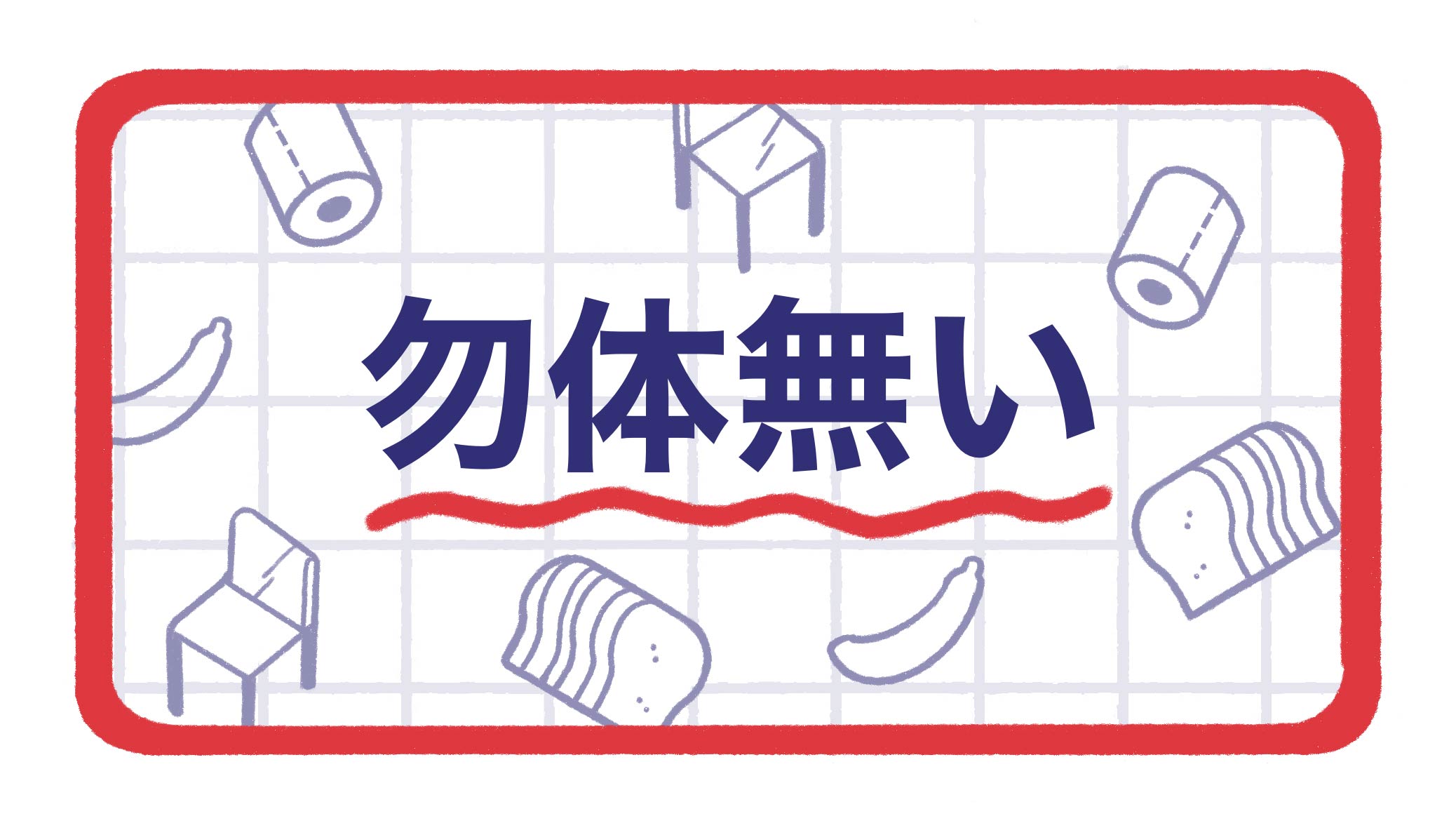Growing up in Japan, I was always told to eat everything that was served on my plate, and not to even waste a grain of rice. If there was something left on my plate, my family would say, eat it up because it's もったいない mottainai otherwise.
It expresses a sense of guilt, regret, or sorrow felt for the act of wasting.
The word もったいない is a Japanese adjective that describes how unfortunate it is for something to go to waste. It expresses a sense of guilt, regret, or sorrow felt for the act of wasting. The feeling connected to the word is deeply entrenched in the culture and the ways of thinking in Japan. Although my grandparents' generation, who experienced poverty living through WWII, might've had a stronger sense of disdain over wasting because of their circumstances, I have also carried a similar sentiment myself. Through constant guilt-tripping and admonishment, I was taught the word もったいない over the years. In fact, many people in Japan likely feel the same way as I do. The word and the spirit behind it have been passed down from generation to generation, and もったいない is a word you'll still hear on a daily basis in Japan.
もったいない is one of those unique Japanese words that I always wish we had in English. Although you can translate it to "what a waste!" or something similar, the subtle nuance and the deep connection to Japanese culture can't quite be articulated in one English word or phrase. Also, there are more situations where you can use もったいない than just simply with something going to waste.
In this article, I will explain the meaning and nuance of the word もったいない and the ideas that it symbolizes. Whether you are already familiar with the word or not, I hope you will discover something new in this article!
…You don't have time to read this article?
Or, you think spending time reading this article is もったいない? Listen to a podcast episode about it that I recorded with my coworker, Jenny. Since you can listen to it while driving, walking your dog, or cooking dinner, you can use your time in a more productive, less もったいない way. If you are not sure what もったいない means in this context, keep reading this article, and/or listen to this podcast episode!
The Origin of もったいない
As a first step to understanding the fundamental meaning of もったいない, let's begin by learning about the origin of it. Many say that the idea of もったいない, or the virtue of not wasting, is rooted in Shintoism in Japan. One of the Shinto teachings, animism, is the belief that everything (even non-living things) has a spirit in it. If you've ever watched the Studio Ghibli movie Spirited Away, which has elements of Shintoism in it, you may remember the different kinds of spirits involved — the chicken spirits, the river spirit, and even a daikon radish spirit. The existence of spirits partly inspired the idea of もったいない. This is because not cherishing or not making the most of things is disrespectful towards spirits.

There are a couple of leading interpretations on how this idea came to be known as もったいない, but many agree that the biggest clue is in how it's written in kanji — 勿体 無い. 無い is a negative marker, so it simply makes it mean "there is no 勿体." Now, what is 勿体?
Some say 勿体 means "the essence of things" or "something awe-inspiring," so with 無い, 勿体無い denotes losing the importance of something or losing something awe-inspiring. In this way, it conveys a sense of guilt, regret, or sorrow for a loss.
もったいない also includes an amount of humbleness, gratitude, and the feeling that nothing should be taken for granted, which is ingrained in the Japanese language.
Others say 勿体 is a form of the Japanese word 物体, which means the "substance of things." So they say 勿体無い indicates the "non-existence of something," which is related to a Buddhist idea that nothing exists on its own and everything exists because of the support given by other things. Even a grain of rice on your plate wouldn't be there if it wasn't for the effort, time, people, and materials — the farmer, the land, the resources — that made it happen and eventually got the rice to you. You and your family worked hard to earn money to purchase it too. So this indicates that the phrase もったいない also includes an amount of humbleness, gratitude, and the feeling that nothing should be taken for granted, which is ingrained in the Japanese language. Even the very common phrase, "thank you" in Japanese, ありがとう arigato, was originally a phrase used to say how rare and special whatever's being appreciated is, and how it shouldn't be taken for granted.
Either way, it explains the nuance of feeling sorry for "someone" or "something." When I say もったいない, I don't always know what exactly I'm feeling sorry for, but I do feel sorry. This remorse felt might be for the spirit of whatever I'm wasting, for everything and everyone that's involved in having brought it to me, or perhaps both.
The Meaning of もったいない
Wasting, in terms of もったいない, is not allowing the opportunity of something reaching its maximum potential to happen.
Now with some knowledge about the origin of もったいない, I'll get into what it means and what kind of nuances it has! First, let's start with defining what "wasting" or 無駄にする is in Japanese. This will help with learning what exactly もったいない expresses regret for. Wasting, in terms of もったいない, is not allowing the opportunity of something reaching its maximum potential to happen. So basically, もったいない expresses regret, guilt, or sorrow for something not reaching its full potential. And, it often implies a desire to make the most out of its future.
So, even though the most common situation for you to say or feel もったいない is when something is thrown away, it can be used for many other kinds of waste, such as wasting potential, time, and opportunity. And sometimes, it can even be used as a way of humbling yourself. Now, let's take a closer look at different kinds of waste that can be もったいない.
もったいない for Wasting Physical Things

The most iconic use of もったいない is for wasting physical things — not finishing the food on your plate, or throwing away still-usable clothes, furniture, and the like. In fact, this aspect of もったいない attracted global attention when Wangari Muta Maathai, a Nobel Peace Prize winner and Kenyan environmental activist, put a spotlight on もったいない. She recognized that it was the only single-word idea that can embody the three Rs — Reduce, Reuse, Recycle — and even a bonus R — "Respect."
Now, let's see how もったいない is actually used. Regardless of our efforts, we've all probably experienced wasting food in the past. You might relate to a situation where, say, you forgot to eat a banana on your counter, and let it go bad. You see that the banana skin browned and say:
- ああ、もったいないことした。
- Ugh, I did such a mottainai thing.
In this sentence, you're using もったいない to describe how letting your banana go bad was もったいない. You're expressing some sort of guilt. You might not always be actively thinking about the spirit of the banana, or of the farmers who grew the banana, or the others who contributed to bringing the banana to you, but it's in the back of your mind and it feels like a loss of some sort of value, both physical and emotional. And there's also the feeling of regret that "I should've eaten it sooner" or "I shouldn't have bought that many bananas."
Since もったいない gets used when something doesn't live up to its full potential, it might make you get more creative.
When you feel もったいない about something, it often lets you have a moment to reflect on what you did and how you can prevent the waste from happening next time. Maybe you're thinking that you should stop buying bananas in bulk. Preventing waste is good, but since もったいない gets used when something doesn't live up to its full potential, it might make you get more creative. You may think of a different way to stop creating more waste in the future, like giving the item a different purpose. Your banana might've gotten a bit old, but you can still find some potential in it. Instead of throwing it away, you might say something like:
- 捨てたらもったいないからマフィンでも作ろう。
- I should bake some muffins with this because it's mottainai to just throw it away.
Just like that, when something is もったいない, repurposing it could be a way to utilize its maximum potential. It's as if you're feeling the guilt of wasting it, and that makes you want to use it even more. Of course, the motivation might come from trying not to waste the monetary value or the resource itself, but もったいない is not only that. Like I mentioned earlier, it's also about not wasting all the effort that's involved in bringing the banana to you. It's sort of like losing some emotional value thinking about all the behind-the-scenes effort that brought the banana to your table. It could feel like a bigger loss if you wasted something that holds more of a special or personal emotional value too. For instance, if it was a banana that your friend went all the way to a tropical island to handpick for your birthday, it would've made it feel extra もったいない.
もったいない for Wasting Time and Opportunities

Besides being used with wasting physical products, もったいない can be used for wasting time as well. Just as Benjamin Franklin said, "Time is money," time is important, and how you spend it is up to you. Unlike goods, time doesn't have a physical form that you can throw away, so wasting time usually means that you are not making good use of it. And using もったいない for it is a way of expressing how your time can be better spent on something else. For example, if you spend two hours commuting to work every day, you might say:
- 通勤する時間がもったいない。
- The time I spend commuting is mottainai.
In this case, you are saying the time spent on your commute is もったいない because you are thinking of how the time could be spent on something more meaningful. If you are a busy working parent, you may wish to spend that time with your children. Or you may simply want to use the time for sleep, relaxation, or to get more house chores done. Now that you've decided your commute is もったいない, this could lead you to finding another job that's closer to your home, or to you working from home. Or perhaps, you might think of a different solution to make the most use of your time, like listening to a language learning podcast during your commute to make the time more meaningful. Just like that, もったいない gets used when something doesn't live up to its full potential, whether it's about wasting something physical or not.
As something that's similar to time, wasting opportunities can be もったいない too. For example, let's say you go on a trip to Japan. When you return from your trip, your friend asks if you ate sushi. If the answer is no, they might say:
- せっかく日本に行ったのに、お寿司を食べなかったなんて、もったいないよ!
- You went all the way to Japan and didn't eat sushi? That's mottainai!
If your friend is the type of person who's always dreamed of visiting Japan to eat sushi there, it's such a missed opportunity and that's totally もったいない that you didn't try sushi in its mecca.
もったいない as "Too Good For 〜"
Since もったいない expresses the feeling of regret when something doesn't live up to its full potential, it can be used when you feel like something is being underutilized, or something is too good for the current usage. For example, let's say you're painting your wall in a brand new $1,000 Gucci shirt. That's quite もったいない, because it's too good (and way too expensive) to wear to in a situation where it could easily be stained…unless you're a successful rapper or something and that's the least valuable shirt you own. Your friend might say:
- そのシャツ着て 壁 ぬるの?もったいないよ!
- Are you going to paint the wall in that shirt? That's mottainai!
In the same vein, this use of もったいない can also be applied to people — like when you think your friend Kyoko deserves a better man than her current boyfriend, Kenichi. You might say something like:
- キョーコは、ケンイチにはもったいない。
- Kyoko is too good for Kenichi.
( Literally: Kyoko is mottainai for Kenichi. )
もったいない is the perfect word to use here. If you think Kyoko is too good for him, it's basically saying Kyoko dating him is wasting Kyoko's potential.
もったいない For Humbling

So now we know that もったいない can be used to describe something that is too good for a certain person or purpose, it might make more sense that もったいない can also be used for showing modesty.
In the previous section, I talked about how you can say "Kyoko is mottainai for Kenichi" to mean "Kyoko is too good for Kenichi." Well, there's more to the story — Kyoko overhears what you've said and she responds:
- ケンイチは、私にはもったいないくらいの彼氏だよ。
- Kenichi is too good for me as a boyfriend.
( Literally: Kenichi is mottainai for me as a boyfriend. )
So now, Kyoko is disagreeing with what you said about her being too good for her boyfriend. We don't know if she really means it, but she even says that it's the other way around — Kenichi is too good for her! By saying something or someone is too good for you like Kyoko just did, もったいない can be used as a way of lowering and humbling yourself. And lowering yourself can be a way of heightening and flattering someone else, like in this case, Kyoko is saying that Kenichi is too good of a boyfriend.
Similarly, when someone who you respect or is of a higher status gives you a compliment, it's common to use this expression:
- もったいないお言葉です。
- I feel so honored to hear that.
( Literally: Your words are mottainai for me. )
Maybe the president of your company is praising your work, and you want to show your modesty by using もったいない to describe how their words are too good for you. It's a very polite and humble way of showing appreciation and how honored you are to receive such a special compliment.
もったいない in Japan

Now that we've talked about the nuances of もったいない, let's talk about how Japanese culture is influenced by it. If you look closely at Japanese culture, especially traditional culture, you can find the concept of もったいない everywhere.
For example, sashiko is a traditional embroidery technique for mending and strengthening your clothes. Back when everything was handwoven, clothes were not disposable. You would cherish the available resources and keep mending the clothing over and over. You can see the influence in a lot of Japanese dishes or culinary techniques as well. For example, sake kasu is the sediment that is leftover from the production of sake. Instead of being thrown away, it gets reused in pickles, seasonings, drinks, moisturizers, and plenty of other things. Okara is the soy pulp that remains after making soy milk or tofu, and often gets used in cooking and baking. In good ol' Japanese home cooking, it's common to hold onto fish bones or vegetable stems and skins to make use of them too.
The abundance of available resources over the decades sadly may have numbed our sense of もったいない.
Despite もったいない being such a beautiful and sustainable concept, in reality, it's hard to say if Japan is living up to this standard in the modern times. Take Japan's well-known excess packaging culture, for example. If you purchased or received snacks like omiyage in Japan, you might notice that they come in multiple layers of wrapping — the box, the individually-packaged goods, the wrapping paper, the plastic bag, etc.! Despite the culinary culture and attempts to reduce waste, the amount of food waste in Japan is one of the biggest in the world, and it's not something we can be proud of. It's the same with buying new houses in Japan too — second-hand houses are less than 15% out of all the houses distributed in the housing market in Japan1, while it's over 70-90% in Western countries. The abundance of available resources over the decades sadly may have numbed our sense of もったいない.
However, that doesn't mean that the spirit of もったいない has completely died down. Because of the current situation, there have been movements that try to combat the issue. By putting a spotlight on the word もったいない, they've been attempting to revive the spirit of not wasting. To name a few examples, the もったいない食品センター (Mottainai Food Center) makes use of consumable food that is otherwise going to go to waste, and Mottainai Japan is an NPO that distributes unused items to people who need them, inside and outside of Japan.
There's also a children's book and anime series called もったいないばあさん (Mottainai Grandma) to educate the future generation on the importance of respecting and cherishing resources. The anime is available for free and even has an English dubbed version, so I highly recommend it if you want to discover the word and the concept もったいない further, especially with your little ones.
These days, things are often too easy to access. That's why people feel the urge to highlight the word もったいない and the philosophy behind it.
Not Knowing もったいない is もったいない!
Words are weird and magical — when a feeling you can't quite put your finger on is given a name, you start becoming more conscious of it. I hope reading this article not only helped you understand the meaning but also instilled the spirit of もったいない in you.
I personally hate when things go waste, and I love the word and the idea of もったいない. It's one word that I would bother to explain to English-speaking friends and family who are not even Japanese learners if I happened to stumble upon a situation where I would use it.
If you've become a fan of もったいない, please start using it and tell your friends about it because it's もったいない if you don't. Feel free to spread this beautiful message of sustainability to the rest of the world!
